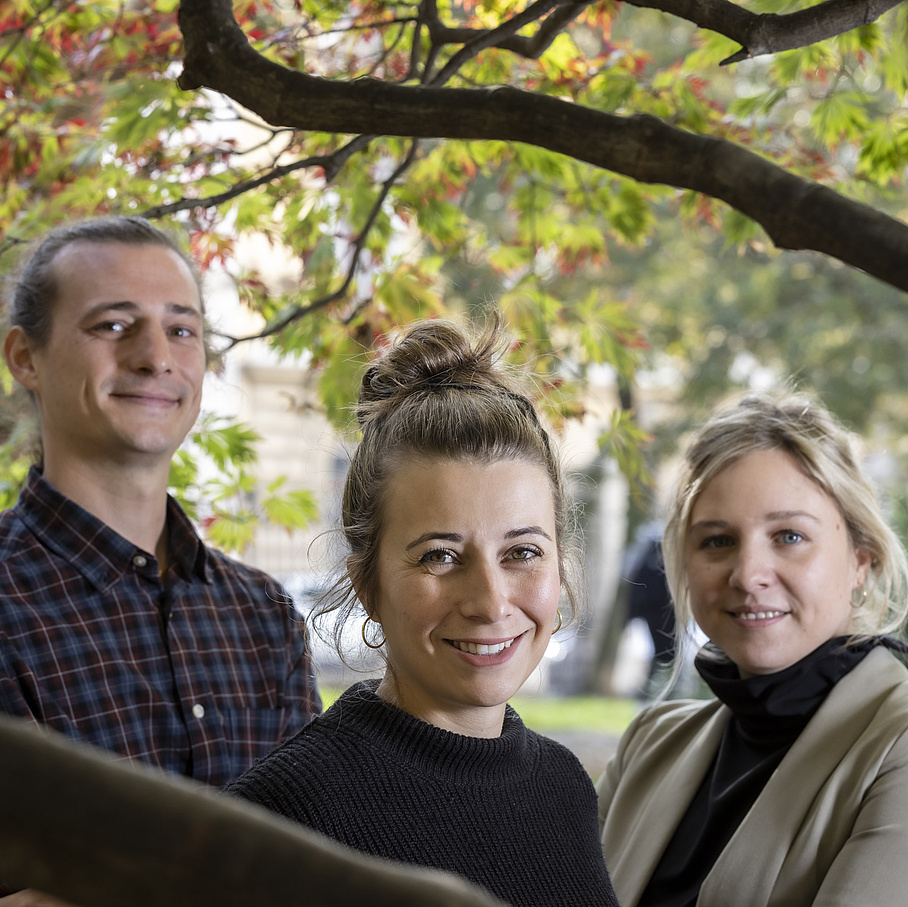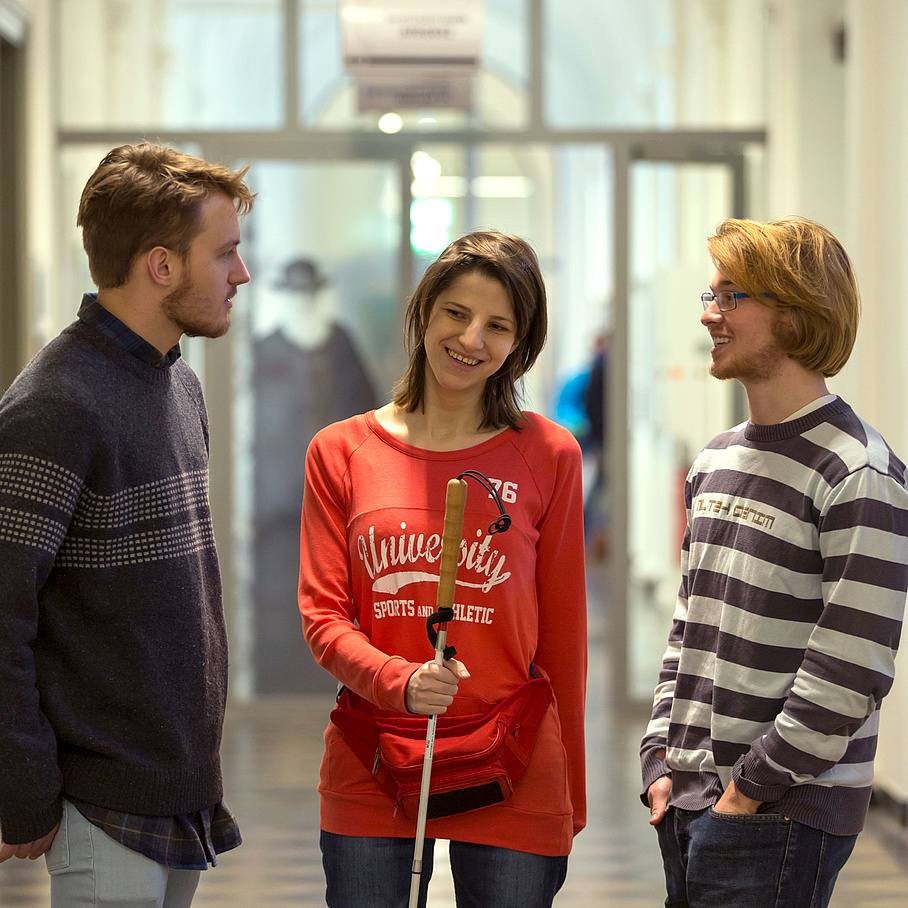
Contact us
Service Point for Accessible Learning
Mandellstraße 9, 1st floor
8010 Graz
barrierefrei-studieren@tugraz.at
Please make an appointment in advance by email: barrierefrei-studieren@tugraz.at
- Autism spectrum disorder
- Attention deficit hyperactivity disorder (ADHD)
- Visual impairments or blindness
- Hearing impairments or deafness
- Limited mobility
- Speech and language impairments
- Dyslexia
- Mental illness
- Chronic diseases
- Temporary functional impairment (acute illness, accident, etc.)
Are you unsure whether you belong to our target group? Then contact us! We can certainly help you or find the right service point for you.

Our Support Services
We provide you with information and support in all situations where barriers occur during your studies. The support services offered by the Service Point for Accessible Learning are listed below.
In addition to the basic support services, you will find special services we offer based on the disability or illness and categorised by topic:
Our support services for students are as unique as the disability or illness itself. In order to ensure equal opportunities for all students, offering individual study support is of great concern to us and involves providing the following services:
- Support with study planning and study organisation
- Support in communicating with teachers, examiners, etc.
- Support in finding and engaging note-taking aids
- Adjustments to examination modalities and framework conditions in the courses
- Preparation of accessible teaching materials
- Provision of answers to legal questions on the topic of disability and studying
- Support in applying for, e.g. the disability pass or the tuition fee waiver in case of disability
At the Service Point for Accessible Learning, you can receive the following information:
- Information about the accessibility of and equipment in rooms on campus. This can also be accessed via the information plans, which are available in TUGRAZonline. Click here to access the instructions.
- Orientation guide for the university campus
The Service Point for Accessible Learning has a range of technical aids that can be borrowed for study purposes. These include FM systems and TactiPads. If you need additional aids, simply contact us.
Target Group-Specific Offers
The Service Point staff consider your individual needs and offer appropriate forms of support:
- Help organising your studies
- Organisation of note-taking aids
- Examination adaptations (arrangements for more examination time and a quiet room)
- Adaptations of the course
For further support, please contact us.
The Service Point staff consider your individual needs and offer appropriate forms of support, such as:
- Help organising your studies
- Organisation of note-taking aids
- Examination adaptations (arrangements for more examination time and a quiet room)
- Adaptations of the course
The Service Point staff help you, for example, by:
- Preparation and adaptation of study documents
- Organisation of note-taking aids
- Provision or organisation of working aids
- Examination adaptations and arrangements for more examination time
- Support with orientation problems
Literature Service
In cooperation with the Integrated Studies Centre at University of Graz, TU Graz students can receive texts in digital formats or as Braille printouts. As the conversion of the texts takes some time, we ask you to contact us as soon as possible.
For this purpose, the GESTU-Graz Service Point for Deaf and Hard of Hearing Students has been established. The Service Point staff offer students a variety of support services:
- Sign language interpreters
- Written interpreters
- Note-taking aids
- Subtitling
- Information and counselling in Austrian Sign Language
The Service Point staff offer support that fits your needs, such as:
- Barrier-free access to lecture halls, workrooms, laboratories, and other spaces by making structural changes or holding classes in accessible locations
- Support in finding assistants for practical exercises
- Examination adaptations and arrangements for more examination time
By making individual agreements with teachers, students and the Service Point, course and examination modalities can be adapted and the necessary framework conditions can be created. Our support offers include:
- Arrangements for more examination time
- Examination adaptation (written instead of oral or vice versa)
- Organisation of note-taking aids
By making individual agreements with teachers, students and the Service Point, the course and examination modalities can be adapted and the necessary framework conditions can be created. Our support offers include:
- Arrangements for more examination time
- Examination adaptation (written instead of oral or vice versa)
- Organisation of note-taking aids
The Service Point staff offer individual counselling and provide various forms of support. This can include adaptations of the course and examination modalities or arrangements for more time if the student experiences an acute onset of the illness. All information provided is, of course, treated confidentially.
You can also make use of the free psychosocial counselling service at TU Graz. You can find more information about this via the TU4U intranet.
The Service Point staff provide individual counselling and support depending on the illness (diabetes, epilepsy, etc.) and need. For example, by making individual arrangements with teachers, the examinations or framework conditions in the course can be adapted.
Even if you experience a temporary functional impairment during your studies as a result of acute illness or an accident, you will receive individual support from the Service Point. Depending on the functional impairment, suitable course or examination adaptations can be made together with the students and lecturers.
Organisational Support
In order to make use of our offers of support, the following procedure must be followed:
- Initial interview: It is necessary to hold an initial interview (by phone, in person, or online), because we feel that it is important that you get to know us and that we get to know you better. In this interview, we will determine together which support might be needed and helpful for you during your studies.
- Confirmation of functional impairment that affects your studies: This confirmation serves as evidence of the disability, impairment, or illness due to a functional impairment that affects your studies. You will receive the form from us during your initial interview. This form must be filled out and signed by a medical specialist, psychotherapist, psychologist, etc. As soon as the signed form has been submitted to our Service Point, you can make use of our offers of support.
In order for students with disabilities, impairments, or illnesses to successfully complete their studies, it is often necessary to adapt the course framework conditions. In order to be able to take advantage of the offer for course adaptations, the following procedure must be followed:
- The Service Point for Accessible Learning must be provided with the confirmation of the functional impairment that affects your studies (in German: Bestätigung über die studienrelevante Funktionsbeeinträchtigung).
- The students, the Service Point for Accessible Learning, and the responsible teachers must determine the necessary framework conditions together before the semester begins (ideally in September). This ensures that teachers have enough time to make the adaptations.
Many students with disabilities, impairments, or illnesses are entitled to use an alternative examination method. Below, you will find all required information regarding how the application and adaptation work and what proof is required.
Application and adaptation:
In order to adapt the examination to fit the needs of a person with a disability, impairment, or illness, the first step is to determine the form of the alternative examination method together with the Service Point for Accessible Learning.
Subsequently, there are two ways to make use of the adapted examination offer:
- Option 1: direct communication and agreement with the course/examination lecturer and presentation of the signed confirmation from the Service Point for Accessible Learning regarding the examination adaptation.
- Option 2: communication and agreement with the course/examination lecturer takes place via the Service Point for Accessible Learning.
Option 1: Direct communication with course or examination lecturer
- Inform the lecturers/examiners at the beginning of the semester of the need to offer an alternative examination method.
- Provide the signed confirmation from the Service Point for Accessible Learning regarding the examination adaptation.
- Put the agreement in writing (e.g. by e-mail, so that it can also be referred to at a later date).
Option 2: Communication with the course or examination lecturer takes place via the Service Point for Accessible Learning
- At the beginning of the semester, let us know which courses you would like to take this semester. We will then contact the lecturers/examiners and provide you with information about the alternative examination method.
- Two weeks before the exam, you will need to provide us with detailed information about the exam (date, time, place, duration). We will then contact the lecturers/examiners and provide you with information about the alternative examination method.
Upon filing an application, regular students may be granted leave of absence for up to 2 semesters depending on the circumstances, for example, in the case of a prolonged illness/sudden disability.
The application for a leave of absence including evidence (e.g. confirmation from a medical specialist) can be submitted directly to the Service Point or sent in a scanned form by e-mail.
You can find the application form and more information about the leave of absence via the TU4U intranet.
Financial Support
To help you complete your studies, even if you only have limited financial resources, or to help you if you find yourself facing a financial crisis, we have reviewed several financial support options here. Depending on your specific situation, you can:
- apply for a tuition fee waiver,
- make use of internal university support services,
- make use of support services outside the university.
Regular students with a degree of disability (in German: Grad der Behinderung or GdB) of at least 50% can have their tuition fees waived for an unlimited period of time or for the respective period that the disability pass is valid.
You need:
Regular students who have been impaired for at least two months in a semester due to an illness (e.g. chronic or mental illness) can apply for a tuition fee waiver for the semester in question.
You need:
Social fund
The TU Graz Student Union provides support for students who are experiencing financial difficulties if certain conditions are met.
ÖGS interpreting costs
If you need an interpreter, the costs will be covered by GESTU-Graz.
Training allowance
The training allowance provides support for people who have completed their compulsory education and who have additional expenses related to continuing education or vocational training due to a disability.
More information about the training allowance
Financial support for families
Family allowance for students (in German: Familienbeihilfe): Students can receive a family allowance until they reach the age of 24. For students with a GdB of at least 50%, the family allowance is extended until they reach the age of 25.
More information
Family hardship compensation (in German: Erhöhte Familienbeihilfe): The family hardship compensation has been established to help people who find themselves facing a financial crisis through no fault of their own, which has been triggered by a particular event (e.g. illness, accident, death).
More information
Basic information on the topic of support for families.
Personal assistance at the workplace/during studies (PAA) - Initiative Social Integration (ISI)
PAA is a service that enables people with disabilities to participate independently and self-sufficiently in their working or university life.
The services have been developed to meet the needs of those receiving assistance, such as note-taking aid for courses, mobility support, help organising studies or obtaining literature, and household help.
Scholarships
There are two different types of scholarships, namely:
- The study grant (in German: Studienbeihilfe): In order to be eligible for this grant, you must be eligible socially and have a favourable academic record.
More information about study grants - Self-employed scholarship (in German: Studienbeihilfe nach Selbsterhalt): This has been developed to help students who have already worked for 4 years prior to beginning their studies.
More information about the self-employment scholarship
For students with disabilities, impairments, and/or illnesses
- the period of entitlement to apply for grants and scholarships is extended,
- the amount of the study grant increases, and
- the age limit increases.
More information on the topic of study grants for students with disabilities
Ministry of Social Affairs (in German: Sozialministerium) – Styrian Regional Office
Individuals can apply for various forms of financial support from the Ministry of Social Affairs / Citizens’ Service, including:
- Reading stations for the visually impaired and blind
- Sign language and communication tools for deaf and severely hearing-impaired persons
- Working assistance
- Job coaching
- Personal assistance at the workplace that provides support (e.g. with manual tasks) both while pursuing studies and at work.
- Wage subsidies for employed academics (integration, remuneration and job security subsidies), as well as subsidies for technical work aids, to create jobs and training positions, to equip the company to meet the needs of disabled persons, or to help them to set up a self-employed business.
Study support
- The study support payment is intended to support students in cases of hardship, e.g. to help them to bridge payments, and it is provided in the form of a one-off payment or a regular scholarship. For further information about the requirements and application, please contact the Graz Scholarship Office.
Furthermore, under certain conditions, people with disabilities can apply for a grant from the support fund.
- The support fund is intended to alleviate or eliminate hardships.
- In particular, this support is intended to help cover the costs of the following measures:
- Adaptations of living spaces and bathrooms,
- Installation of stairlifts,
- Provision of communication aids,
- Adaptations to improve mobility (car conversion required due to disability) and
- Provision/Training of assistance dogs
Social Fund from the City of Graz
If certain conditions are met, the City of Graz provides support for Graz residents in emergency situations.
More information about the Social Fund
Care allowance (in German: Pflegegeld)
The care allowance is a lump-sum cash benefit provided based on additional care-related expenses. It is intended to enable the individual to lead an independent and fulfilling life.
Support for Teaching Staff
- Information and counselling regarding how to create the necessary framework conditions in courses to meet the needs of students with disabilities, impairments, or illnesses
- Counselling about and implementation of alternative examination methods
- Raising awareness for the topic of students who are studying with a disability, impairment, and/or chronic or mental illness
Our Team

Madlen BERGER
Phone: +43 664 60 873 4772
barrierefrei-studieren@tugraz.at

Wilfried GRASSEGGER
Phone: +43 664 60 873 6561
barrierefrei-studieren@tugraz.at

Karin STEINER-KROTTMAYER
Phone: +43 664 8216254
barrierefrei-studieren@tugraz.at

Michaela STEINKELLNER
Phone: +43 664 88 892 185
barrierefrei-studieren@tugraz.at

Melanie GRAF-MANDL
currently on maternity leave

Carmen SCHROTTER-STADLAUER
currently on maternity leave
Please make an appointment in advance by email: barrierefrei-studieren@tugraz.at.
Address: Mandellstraße 9, 1st floor, 8010 Graz
Our Service Point is accessible by public transportation and car.
By bus and tram
Tram lines: 1 and 7
Stop: Kaiser-Josef-Platz/Opera
Walking distance: approx. 3 min. Kaiser-Josef-Platz/Opera - Mandellstraße 9
Tram lines: 3/5
Stop: Mandellstraße
Walking distance: approx. 2 min. stop Mandellstraße - Mandellstraße 9
Bus lines: 30, 31 and 39
Bus stop: Kaiser-Josef-Platz/Opera
Walking distance: approx. 3 min. Kaiser-Josef-Platz/Opera - Mandellstraße 9
Do you need a pick-up service? If so, please let us know where and when you will be arriving. We will organise everything else.
Arrival by car
There are public parking zones located very close to our service centre. If you need an accessible parking space, please contact us, and we can provide access to parking in the courtyard.
FAQ - Frequently asked questions
Yes, all services related to disabilities and support services are free of charge for you as a TU Graz student.
No. Absolutely not. The information about who uses the service offers is not passed on to third parties.
No. Together with the lecturer, we can find a solution that allows for alternative examination modalities. This could mean, for example, that you would perform your calculations in the lecturer's office or hand in individual work.
Further Information
UN Convention on the Rights of Persons with Disabilities: According to Article 24 "Education", all persons with disabilities have the right to receive an education. For students with disabilities, this means that the curricular requirements must be adapted to include alternative examination methods. Of course, the educational goal of the chosen degree programme must be achievable. This is also regulated in the Universities Act §58 paragraphs 10 and 11.
National Action Plan on Disability 2022-2030: The national strategy regarding social aspects of higher education is clearly described in the NAP 2022-2030. This addresses inclusive access to higher education for all persons. In order to enable students with disabilities to study inclusively, necessary objectives and measures are defined in Chapter 4.4 Universities, Higher Education, Science and Research.
The use of alternative examination methods for students with disabilities is stipulated in the Universities Act 2002, Section 3, §59 (para. 1) lit. 12: "Rights and duties of students": "Students are entitled to freedom of education in accordance with the legal provisions. This includes, in particular, the right to use an alternative examination method, if the student can prove that they have a long-term disability which makes it impossible for them to take the examination using the originally prescribed method, and if the examination content and requirements are not impaired by the use of an alternative method".
Study-law board (in German: Satzungsteil Studienrechtliche Organisation (Organe) der TU Graz): Provisions regarding examination adaptations
Affirmative Action Plan of TU Graz: The support services provided by the Service Point for Accessible Learning as well as the alternative examination methods that may be used to compensate for potential disadvantages and the implementation of the Universities Act requirements are defined in §19 Degree Programme and §20 Service Point for Accessible Learning of the TU Graz Affirmative Action Plan.
GESTU-Graz Service Point
GESTU-Graz is a service point for deaf and hearing-impaired students in Graz.
Working Group for Equal Opportunities
This group provides TU Graz students and employees with support in cases of discrimination, sexual harassment, harassment, or mobbing.
Disability Liaison Officer
The officer provides support for employees with disabilities, impairments, and/or chronic or mental illnesses in all matters relating to disability and work.
HTU - Social Affairs Office
The Social Affairs Office is a free contact point for students with social problems.
Graz Ombudsperson's Office
Students can visit the Ombudsperson's Office if they experience any conflicts in courses, during examinations, or during the admission process, as well as if they would like to make suggestions for improving the study conditions.
Peer-to-Peer Counselling
Peer-to-peer counselling is a service offered by students with disabilities, impairments, and/or chronic or mental illnesses for students with disabilities, impairments, and/or chronic or mental illnesses.
Psychosocial Counselling Centre for TU Graz Students
The psychosocial counselling centre supports TU Graz students and helps them to find solutions to both work-specific problems and personal conflict situations.
Registrar’s Office
The Registrar’s Office provides support for students in all matters relating to studying from their first admission to graduation, including tuition fee regulations, deregistration, applications for a leave of absence, and much more.
Acute emergency
- Counselling hotline - Tel. 142
New in Graz?
- You can find information for people with disabilities on the City of Graz website.
General information
- Advocacy for people with disabilities in Styria
- Liaison Officer in Graz
- Vocational Education and Rehabilitation Centre (in German: Berufliches Bildungs- und Rehalbilitationszentrum or BBRZ)
- Myability
- Network for Professional Assistance (in German: Netzwerk berufliche Assistenz or NEBA)
- Psychological counselling for students
- Independent living
- Uniability
- Wegweiser
People with hearing impairment and deaf people
- Styrian Regional Organisation of Associations for Hearing Loss (in German: Steirischer Landesverband der Gehörlosenvereine)
- Austrian Federation of People with Hearing Loss (in German: Österreichischer Gehörlosenbund or ÖGLB)
- GESTU-Graz Service Point
- Association of Austrian Students with Hearing Loss (in German: Verein österreichischer gehörloser Studierender or VÖGS)
People with visual impairments and blind people
- Austrian Association for the Blind and Visually Impaired (in German: Blinden- und Sehbehindertenverbandes Österreich or BSVÖ)
- Styrian Association for the Blind and Visually Impaired (in German: Blinden- und Sehbehindertenverband Steiermark or BSVSt)
- Odilia Institute (in German: Odilien Institut)
People with mental illness
People with autism spectrum disorder

